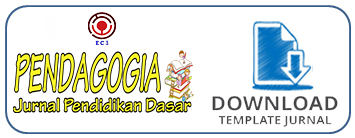Analisa Implementasi Pembelajaran Daring di Sekolah Tingkat Dasar Se-Kota Serang
Keywords:
evaluation, instruction, pandemicAbstract
Pandemic Covid-19 is a phenomenon that has a very important impact on the order of life. Education is one of the fields that has felt the impact of the pandemicCovid-19 in Indonesia. Based on a circular relating to policies for implementing education during the emergency deployment period Covid-19 which has the impact of changing normal learning activities to distance learning. A program that is unusual to implement is certainly a program that needs to be analyzed regarding the implementation of the program. Primary level schools in Serang City are one of the objects that need to be explored regarding the implementation of distance learning. The aim of this research is to find out how online learning was implemented during the pandemic Covid-19 in elementary schools throughout the city of Serang. The method used is an evaluative qualitative research method using an evaluation model responsive evaluative according to Robert Stake's. Data collection techniques used include interviews, observation and documentation. The research results show that the implementation of online learning during the pandemic Covid-19 in elementary schools throughout the city of Serang is said to be quite conducive. This is of course adjusted to the conditions of each school. Facts on the ground show that the implementation of online learning is also influenced by internal and external factors.
Downloads
References
Ajat Rukajat. (2018). Pendekatan Penelitian Kualitatif (Qualitative Research Approach). Deepublish.
Aprida Pane dan Muhammad Darwis Dasopang. (2017). Belajar dan Pembelajaran. Jurnal Kajian Ilmu-Ilmu Keislaman, 3(2), 333. https://doi.org/10.24952/fitrah.v3i2.945.
Anggraeni, V., & Perdana, P. I. (2023). Pengaruh Pembelajaran Tatap Muka Terhadap Psikologis Siswa di Masa Pandemi COVID-19. Pendagogia: Jurnal Pendidikan Dasar, 3(2), 61–71. Retrieved from https://jurnal.educ3.org/index.php/pendagogia/article/view/103.
Asep Djaenudin. (2021). Urgensi Penyesuaian Metode Pembelajaran di Era Discruptive Technology. Jurnal Pari, 1(8).
Badrun Kartowagiran. (2011). Kinerja Guru Profesional (Guru Pasca Sertifikasi). Jurnal Cakrawala Pendidikan, XXX(3).
Haji, S. (1993). Pembelajaran Tematik Yang Ideal Di Sd/Mi. 6, 56–69.
Ihwanah, A. (2020). Problematika Pembelajaran Daring Di Sekolah Dasar Pada Era Pandemi Covid-19. JIEES : Journal of Islamic Education at Elementary School, 1(2), 44–51. https://doi.org/10.47400/jiees.v1i2.15
Muri Yusuf. (2017). Metode Penelitian Kuantitatif, Kualitatif, dan Penelitian Gabungan. Kencana.
Peraturan Pemerintah Republik Indonesia Nomor 21 Tahun 2020 Tentang Pembatasan Sosial Berskala Besar Dalam Rangka Percepatan Penanganan Covid-19. (n.d.).
Rafinudin, M. B. and M. A. (2017). Urgensi Penggunaan Media Dalam Proses Pembelajaran Bagi Guru Sekolah Dasar Wilayah II Kecamatan Sanrobone Kabupaten Takalar Provisi Sulawesi Selatan. Prosiding TEP & PDs, 2(3).
Saddam Husein. (2018). Urgensi Media Dalam Proses Pembelajaran. Al-Iltizam: Jurnal Pendidikan Agama Islam, 3(2).
Surat Edaran Nomor 4 Tahun 2020 Tentang Pelaksanaan Kebijakan Pendidikan Dalam Masa Darurat Penyebaran Covid-19. (n.d.).
Wahidah, I., Athallah, R., Hartono, N. F. S., Rafqie, M. C. A., & Septiadi, M. A. (2020). Pandemik COVID-19: Analisis Perencanaan Pemerintah dan Masyarakat dalam Berbagai Upaya Pencegahan. Jurnal Manajemen Dan Organisasi, 11(3), 179–188. https://doi.org/10.29244/jmo.v11i3.31695.
Wijaya, W. P., Asrin, & Lalu Hamdian Affandi. (2022). Evaluasi Proses Belajar Dari Rumah (BDR) Pada Masa Pandemi Covid-19 di SDN 1 Setanggor dan SDN 2 Setanggor. Pendagogia: Jurnal Pendidikan Dasar, 2(2), 147–156. Retrieved from https://jurnal.educ3.org/index.php/pendagogia/article/view/64.
Yani Fitriyani, I. F. dan M. Z. S. (2020). Motivasi Belajar Mahasiswa Pada Pembelajaran Daring Selama Pandemik Covid-19. Profesi Pendidikan Dasar, 7(1), 121–321. https://doi.org/10.23917/ppd.v7il.10973.
Downloads
Published
Issue
Section
License
Copyright (c) 2023 Syifaun Najat, Fitri Hilmiyati, Oman Farhurohman

This work is licensed under a Creative Commons Attribution-NonCommercial-ShareAlike 4.0 International License.








